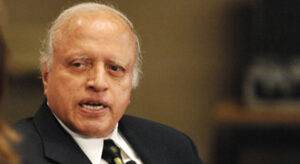Honorary Fellows
Dr. M.S. Swaminathan

Prof. Monkombu Sambasivan Swaminathan (born August 7, 1925) is an agricultural scientist and heads the MS Swaminathan Research Foundation. Swaminathan is known as ‘Father of Indian Green Revolution’ for his contributions to the Green Revolution movement in India. Swaminathan’s contributions to the agricultural renaissance of India have led to his being widely referred to as the scientific leader of the green revolution movement. He is now widely known for his advocacy of environmentally sustainable agriculture and sustainable food security.
He graduated from Cambridge in 1952 with a Ph. D in genetics. Swaminathan brought into India seeds developed in Mexico by U.S. agricultural guru Norman Borlaug and, after cross-breeding them with local species, created a wheat plant that yielded much more grain than traditional types. Scientists at IRRI accomplished the same miracle for rice. Imminent tragedy turned to a new era of hope for Asia, paving the way for the Asian economic miracle of the 1980s and ’90s.
Swaminathan was Chairman of the UN Science Advisory Committee set up in 1980 to take follow-up action on the Vienna Plan of Action. He has also served as Independent Chairman of the FAO Council and President of the International Union for the Conservation of Nature and Natural Resources. He is the current President of the Pugwash Conferences on Science and World Affairs (the first person from a third world country to be elected the president). He is also on the Board of Trustees of Alexandria Bibliotheca – the only non-White and non-Arab on the board. Swaminathan is a Fellow of the Royal Society of London and the U S National Academy of Sciences. He currently holds the UNESCO Chair in Ecotechnology at the M S Swaminathan Research Foundation in Chennai (Madras), India. He is the chairman of the National Commission on Agriculture, Food and Nutrition Security of India.
The International Association of Women and Development conferred on him the first international award for significant contributions to promoting the knowledge, skill, and technological empowerment of women in agriculture and for his pioneering role in mainstreaming gender considerations in agriculture and rural development. Swaminathan has received other awards and prizes such as Magsaysay Award for Community Leadership (1971), Albert Einstein World Science Award (1986), World Food Prize (1987), Four Freedoms Award (2000), Planet and Humanity Medal of the International Geographical Union (2000), Padma Shri (1967), Padma Bhushan (1972), Padma Vibhushan (1989) and 46 honorary doctorate degrees from universities around the world. Swaminathan has been described by the United Nations Environment Programme as “the Father of Economic Ecology” and by Javier Perez de Cuellar, Secretary General of the United Nations, as “a living legend who will go into the annals of history as a world scientist of rare distinction”. He was also included in TIME Magazine’s 1999 list of the world’s 100 most influential Asian people.
